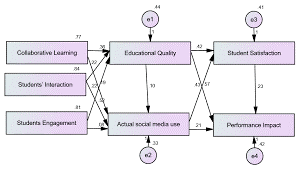Internet of Things (IoT) based Investigation between Instructors' Insight of Constructivist Learning Theory and Learners Performance analysis in Higher Vocational Accounting Training
Main Article Content
Abstract
The teaching mode of the higher vocational accounting profession plays a significant role in fostering students' professional knowledge, skills, and competencies. In recent years, constructivist learning theory has become increasingly popular in the field of education due to its emphasis on active student engagement, knowledge construction, and the integration of real-world experiences. This research paper aims to explore the application of constructivist learning theory in the teaching mode of higher vocational accounting profession. The aim of this study is to investigate the relationship between teachers' perception of constructivist learning theory and students' academic performance in higher vocational accounting education with the integration of the Internet of Things (IoT). A weighted approach model with optimization is proposed to quantify the impact of the teachers' perception of constructivist learning theory on the students' academic performance. Data is collected from 300 higher vocational accounting students and 30 accounting teachers using a self-designed questionnaire. The results indicate that the teachers' perception of constructivist learning theory has a significant positive impact on students' academic performance. Moreover, the proposed weighted approach model with optimization shows promising results in accurately measuring the impact of teachers' perception of constructivist learning theory on students' academic performance. This study provides valuable insights for higher vocational accounting education with IoT and suggests that teachers should incorporate constructivist learning theory principles in their teaching practices to improve students' academic performance..
Article Details
References
Mali, D., & Lim, H. J. (2022). Can the introduction of a research-informed teaching intervention enhance student performance and influence perceptions?. Accounting Education, 31(3), 322-346.
Gittings, L., Taplin, R., & Kerr, R. (2020). Experiential learning activities in university accounting education: A systematic literature review. Journal of accounting education, 52, 100680.
Ainsworth, J. (2021). Team-Based Learning in professional writing courses for accounting graduates: positive impacts on student engagement, accountability and satisfaction. Accounting Education, 30(3), 234-257.
Mohammed, N. F., Kassim, C. F. C., & Ismail, P. M. (2020). Students’ Perception on Pedagogical Approaches and its Relation to Exam Performance in Professional Accounting Education. Asian Journal of University Education, 16(2), 116-130.
Terblanche, W., Fakir, D., Chinyamurindi, W., & Mishi, S. (2021). Impact of self-esteem and student-and-lecturer interaction on academic performance in a chartered accounting programme. Journal of Further and Higher Education, 45(4), 464-480.
Russo, A., Warren, L., Neri, L., Herdan, A., & Brickman, K. (2022). Enhancing accounting and finance students’ awareness of transferable skills in an integrated blended learning environment. Accounting Education, 31(1), 67-91.
Oosthuizen, H., De Lange, P., Wilmshurst, T., & Beatson, N. (2021). Teamwork in the accounting curriculum: Stakeholder expectations, accounting students’ value proposition, and instructors’ guidance. Accounting Education, 30(2), 131-158.
Jayasinghe, K. (2021). Constructing constructivism in management accounting education: reflections from a teaching cycle with innovative learning elements. Qualitative Research in Accounting & Management, 18(2), 282-309.
Mellado, L., Parte, L., & Villanueva, E. (2020). Perceptions of the accounting profession based on an analysis of metaphors by undergraduate accounting students. Accounting Education, 29(6), 572-604.
Doyle, E., Buckley, P., & McCarthy, B. (2021). The impact of content co-creation on academic achievement. Assessment & Evaluation in Higher Education, 46(3), 494-507.
Santyasa, I. W., Rapi, N. K., & Sara, I. (2020). Project based learning and academic procrastination of students in learning physics. International Journal of instruction, 13(1), 489-508.
Sugahara, S., & Cilloni, A. (2021). Mediation effect of students’ perception of accounting on the relationship between game-based learning and learning approaches. Journal of Accounting Education, 56, 100730.
Mapuya, M. (2022). Promoting self-regulated learning among first-year accounting-student teachers: A student-empowerment pedagogical framework. International Journal of Learning, Teaching and Educational Research, 21(5), 64-83.
Doyle, E., & Buckley, P. (2022). The impact of co-creation: an analysis of the effectiveness of student authored multiple choice questions on achievement of learning outcomes. Interactive Learning Environments, 30(9), 1726-1735.
Gultepe, M., & Simsek, N. (2020). The effect of constructivist learning environment on students’ motivation in higher education. International Journal of Evaluation and Research in Education, 9(2), 358-365.
Huang, R., & Li, X. (2019). The impact of constructivist teaching on academic achievement in accounting education. Journal of Accounting Education, 47, 48-58.
Huang, R., & Li, X. (2021). The impact of flipped classroom on academic achievement in accounting education. Journal of Education for Business, 96(1), 28-36.
Khoiriyah, N., Sabrina, E., & Asri, R. (2021). The effect of constructivist-based learning on critical thinking skills and academic achievement in accounting education. Journal of Accounting Education, 58, 100778.
Kusumaningrum, D. R., & Kartikasari, M. (2020). The relationship between teachers’ constructivist teaching beliefs and students’ academic performance in accounting education. International Journal of Evaluation and Research in Education, 9(4), 777-782.
Lin, C. Y., & Yeh, Y. C. (2017). Impact of a constructivist learning environment on student academic performance: An empirical study. Journal of Education and Practice, 8(5), 144-154.
Liu, S., & Liu, J. (2019). An empirical study on the effect of constructivism teaching on accounting teaching. Education and Teaching Research, 2(3), 311-314.
Tahir, M., & Jamil, M. (2020). The impact of teachers’ constructivist teaching beliefs on students’ academic achievement in accounting education: Evidence from Pakistan. International Journal of Evaluation and Research in Education, 9(2), 252-257.
Wang, X., Chen, J., & Cui, J. (2017). Collaborative learning in accounting education: A case study in China. Journal of Accounting Education, 38, 39-50.
Ye, M., & Fang, H. (2021). Teachers’ constructivist teaching beliefs, students’ learning motivation and academic performance: Evidence from China. Studies in Educational Evaluation, 70, 100991.
Yin, L., Guo, Z., & Sun, L. (2020). The impact of constructivist learning environment on accounting education. Journal of Accounting Education, 52, 100703.
Al-Rahmi, A. M. (2020). Constructivism theory: The factors affecting students’ academic performance in higher education.
Doménech-Betoret, F., Gómez-Artiga, A., & Abellán-Roselló, L. (2019). The educational situation quality model: a new tool to explain and improve academic achievement and course satisfaction. Frontiers in psychology, 10, 1692.

